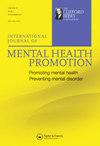An ecological model of mental health promotion for school communities: adolescent views about mental health promotion in secondary schools in the UK
IF 1.4
4区 医学
Q4 PSYCHIATRY
International Journal of Mental Health Promotion
Pub Date : 2014-10-20
DOI:10.1080/14623730.2014.963402
引用次数: 10
Abstract
This research gained the views of adolescents about mental health promotion in secondary schools in England, the UK. A flexible design, using self-contained focus group methodology explored views of 26 adolescents. A funnel approach structured five focus groups, each consisting of between three and eight adolescents. Semi-structured questions were asked in an informal, child-centred environment (Morgan, Gibbs, Maxwell, & Britten, 2002, Hearing children's voices: Methodological issues in conducting focus groups with children aged 7–11 years’, Qualitative Research,2, 5–20). A constructivist grounded theory analysis enabled categories and theory to emerge. Theoretical concepts were mapped onto an ecosystems model (Bronfenbrenner, 1979, The ecology of human development: Experiments by nature and design, Cambridge, MA: Harvard University Press) resulting in an ecological framework for mental health promotion in school communities working at three levels: Macro, Meso and Micro. The research concludes that for schools to promote mental health, society and school communities need to provide active listening cultures and an inclusive ethos to embrace mental health promotion. A need arises for adults to have knowledge and understanding of child and adolescent development, identity and the importance of relationships.学校社区心理健康促进的生态模式:英国青少年对中学心理健康促进的看法
本研究了解了英国英格兰中学生对中学心理健康促进的看法。一个灵活的设计,使用独立的焦点小组方法探讨了26名青少年的观点。一个漏斗方法组织了五个焦点小组,每个小组由三到八名青少年组成。在非正式的、以儿童为中心的环境中提出半结构化的问题(Morgan, Gibbs, Maxwell, & Britten, 2002,《倾听儿童的声音:与7-11岁儿童进行焦点小组的方法问题》,《定性研究》,第2期,5-20页)。基于建构主义的理论分析使范畴和理论得以出现。理论概念被映射到一个生态系统模型(Bronfenbrenner, 1979,人类发展的生态学:自然和设计的实验,剑桥,马萨诸塞州:哈佛大学出版社),导致在三个层面上促进学校社区心理健康的生态框架:宏观,中观和微观。研究得出结论,学校要促进心理健康,社会和学校社区需要提供积极倾听的文化和包容的精神,以接受心理健康的促进。成年人需要了解和理解儿童和青少年的发展、身份和关系的重要性。
本文章由计算机程序翻译,如有差异,请以英文原文为准。
求助全文
约1分钟内获得全文
求助全文
来源期刊
CiteScore
1.70
自引率
7.70%
发文量
52
期刊介绍:
This title has ceased (2018). The first journal of its kind in the field, IJMHP publishes materials of distinction, making it essential reading for those with a professional or personal interest in mental health promotion. IJMHP co-ordinates the dissemination of new research outcomes to all those involved in policy making and the implementation of mental health promotion and mental disorder prevention policies. This makes it indispensable to clinical/medical staff, health services researchers, managers, health promoters, educationalists, sociologists, health economists and practitioners from all branches of health and social care, publishing materials by and for all these communities. IJMHP is an official publication of the Clifford Beers Foundation, who work to promote mental health and prevent mental disorders through dissemination of knowledge, training partnerships and consultation. The journal is peer reviewed by an expert international board and acts as a comprehensive information resource designed to increase awareness, foster understanding and promote collaboration between the different disciplines engaged in this diverse activity of study.

 求助内容:
求助内容: 应助结果提醒方式:
应助结果提醒方式:


